In a world where people of every age are dealing with depression and anxiety, meditation has become more than just a practice, it's a necessity for mental well-being.
When daily stresses, work pressures, and personal challenges increase, people find ways to discover peace and clarity in their lives.
Meditation not only helps in lowering anxiety but also promotes a feeling of mindfulness, focus, and general health.
With rising knowledge of its benefits, the demand for meditation has increased in recent years. This is where meditation apps like Headspace have changed the way people approach mental health.
These apps have become integral tools, giving easy access to guided lessons and relaxation methods.
As this demand continues to rise, many businesses are wondering, "How much does it cost to create an app like Headspace?" The average cost to create an app like Headspace can range between $25,000 to $150,000, depending on multiple factors.
The journey to develop an app like Headspace comes with its own set of challenges, and understanding the cost factors can help in making informed choices.
Let’s dig into the details of how much it really costs to build an app like Headspace and the key elements involved in the process.
What is Headspace?
Headspace is a leading meditation and mindfulness application designed to help users reduce stress, improve focus, and enhance overall well-being through guided meditation sessions and mental health resources.
Founded in 2010 by Andy Puddicombe and Richard Pierson, the app has gained global recognition for making meditation accessible to millions.
Key Statistics
-
Revenue: In 2023, Headspace generated an estimated $195 million in revenue.
-
Subscribers: The app boasts approximately 2.8 million paying subscribers.
-
Downloads: Headspace has been downloaded over 80 million times worldwide, reflecting its widespread popularity.
-
Commercial Partnerships: More than 2,700 businesses have partnered with Headspace to offer the app to their employees, highlighting its integration into corporate wellness programs.
-
Valuation: Following its merger with on-demand mental health platform Ginger, the combined entity, Headspace Health, was valued at $3 billion.
How Meditation Apps Can Benefit Your Business in 2025?
In 2025, the meditation app industry is expected to continue its upward trend, making it a highly lucrative market for companies. Beyond revenue, developing a meditation app offers numerous benefits that can significantly boost your business.
Let’s explore how building a meditation app can position your business for growth and success.
1. Tap Into a Growing Market
The world mindfulness and meditation market is growing at a remarkable pace. By 2025, it is expected to hit over $4 billion in value, driven by greater mental health awareness and the adoption of digital wellness tools.
By entering this market, companies can cater to a large, diverse audience wanting convenient mental health options.
2. Recurring Revenue Streams
Top fitness apps often work on subscription-based models, giving businesses a steady amount of recurring income. With tiered price choices, businesses can target a range of customers, from casual users to paid members.
Features like in-app payments for exclusive material or classes can further increase revenue.
3. Brand Credibility and Customer Loyalty
Offering a meditation app helps identify your brand as a booster of mental health and well-being. Customers are more likely to believe and stay loyal to companies that value health.
Integrating features like custom meditation plans or real-time mental health support can further strengthen your brand's trustworthiness.
4. Leverage Data for Insights
Meditation apps provide businesses with access to important user data. Insights such as user tastes, involvement times, and session completion rates can help you improve the app’s features, personalize the user experience, and create targeted marketing campaigns.
5. Reach a Global Audience
Meditation apps overcome regional borders, making them a global business possibility. With multilingual support and localized material, companies can cater to diverse cultures and regional preferences, expanding their market reach and boosting income potential.
6. Corporate Wellness Partnerships
In 2025, corporate wellness programs are likely to grow greatly as companies invest in employee mental health. By partnering with companies, your meditation app can become a go-to resource for workplace mindfulness, opening a new income stream through B2B partnerships.
7. Low Maintenance Costs After Development
Once the original investment in the development of a fitness app is made, keeping and improving a meditation app is relatively cost-effective. Regular updates, new content additions, and rare bug fixes can keep users involved without needing constant high-level costs.
8. Positive Social Impact
Finally, creating a meditation app allows your business to contribute effectively to society by spreading mental health knowledge and giving tools for self-care. This socially responsible method can boost your brand image and attract customers who value businesses with a reason.
By 2025, meditation apps will not only serve as important health tools but also act as a profitable and effective business venture. With the right features, user-centric design, and marketing strategy, businesses can tap into this growing industry and enjoy lasting growth.
Features Required to Develop an App Like Headspace
Creating an app like Headspace requires integrating user-centric features that ensure seamless functionality and engagement. Below are the key features essential for building a successful meditation app:
► User Registration and Profile Management
Allow users to sign up via email, social media, or phone numbers and create personalized profiles for tracking their meditation journey.
► Guided Meditation Sessions
Offer a wide range of audio or video-guided meditation sessions tailored to different goals like stress relief, sleep improvement, or focus enhancement.
► Personalized Recommendations
Use AI algorithms to suggest sessions based on user preferences, past activity, and goals for a customized experience.
► Progress Tracking and Analytics
Enable users to track their meditation streaks, session durations, and overall progress to stay motivated.
► Push Notifications and Reminders
Send gentle reminders for daily meditations or newly added sessions to encourage consistent usage.
► Offline Mode
Allow users to download sessions and meditate offline, making the app accessible without an internet connection.
► In-app purchases and Subscriptions
Provide premium content and features through tiered subscription plans or one-time purchases to monetize the app effectively.
► Breathing Exercises and Quick Relaxation Tools
Include simple breathing techniques and quick relaxation exercises for users seeking instant stress relief.
► Integration with Wearables
Sync the app with wearable devices like smartwatches to monitor physical stats such as heart rate during meditation.
► Community Features
Add forums or social spaces where users can share their experiences, seek guidance, and build a supportive mindfulness community.
► Multi-Language Support
Provide content in multiple languages to cater to a global audience and expand the app’s reach.
► Content Library
Maintain a vast library of mindfulness content, including meditations, sleep stories, and mental health guides.
► Gamification Elements
Incorporate badges, rewards, or levels to gamify the experience and encourage users to stay consistent with their meditation goals.
► Expert-Led Live Sessions
Offer live sessions with meditation experts to provide users with real-time guidance and a personal touch.
► Mood Tracking and Journaling
Allow users to record their moods and thoughts in a built-in journal, helping them reflect on their mental state and track emotional progress over time.
These features form the basis of a successful meditation app and help ensure high user engagement, satisfaction, and retention.
Average Cost to Create an App Like Headspace
Developing a meditation app like Headspace involves multiple factors that influence the overall cost. The Headspace-like app development cost typically ranges between $25,000 to $150,000, depending on the app’s complexity, features, platform compatibility, and the development team’s location.
For a basic app with minimal features, the cost may be on the lower end of the spectrum, while a feature-rich app with advanced functionalities could go beyond the higher limit.
|
App Type |
Estimated Cost |
Details |
|
Basic App |
$50,000 - $70,000 |
Includes essential features like user registration, guided meditation sessions, basic UI/UX design, and offline mode. Ideal for startups or MVPs. |
|
Mid-Range App |
$80,000 - $120,000 |
Offers advanced features like personalized recommendations, progress tracking, multi-language support, and in-app purchases. Suitable for scaling businesses. |
|
Advanced App |
$130,000 - $150,000+ |
Includes all premium features such as AI-based recommendations, wearable device integration, live expert sessions, and gamification. Best for apps targeting a global audience. |
This breakdown helps in understanding how different levels of complexity and features affect the overall cost of development.
Factors Influencing the Cost to Build an App Like Headspace
The cost to develop an app similar to Headspace is influenced by several crucial factors, which ultimately determine the complexity, timeline, and budget of the project.
Understanding these factors is essential when planning your app development.
Whether you are looking for the cost to create a meditation app like Headspace or the cost to develop an app like MyFitnessPal's feature-rich version, these elements play a major role in setting the overall cost.
Let’s dive deeper into each factor that influences the cost to build an app like Headspace:
A] App Features and Functionality
The more complicated and feature-rich your meditation app is, the higher the cost. A Headspace clone app development cost is usually higher due to advanced features like AI suggestions, custom meditation plans, and competition.
You can start with basic functions, such as guided exercises and progress tracking, but as you grow and add paid features, the cost to develop an app like Headspace will rise.
|
Feature Type |
Estimated Cost |
Details |
|
Basic Features (User Profiles, Audio Content) |
$15,000 - $30,000 |
Includes essential meditation content, user registration, and basic UI/UX. |
|
Medium Features (Progress Tracking, Push Notifications) |
$30,000 - $50,000 |
Features like habit trackers, reminders, and personalized recommendations. |
|
Advanced Features (AI Recommendations, Wearable Integration) |
$50,000 - $100,000+ |
Premium features like AI-based personalization, live sessions, and gamified experiences. |
B] Platform Selection
Choosing the right platforms for your app plays a big part in setting the total Headspace-like app development cost.
You may choose to develop the app for iOS, Android, or both. Cross-platform apps usually cost less due to sharing codebases, whereas native apps tend to have better performance but at a higher development cost.
|
Platform |
Estimated Cost |
Details |
|
Single Platform (iOS or Android) |
$20,000 - $50,000 |
Suitable for targeting a specific audience initially. |
|
Cross-Platform (iOS & Android) |
$50,000 - $100,000 |
Ideal for reaching a wider audience with reduced development time. |
C] UI/UX Design
The design of your app is a major factor that impacts user involvement. A user-friendly interface mixed with an aesthetically pleasing design improves user retention.
More complicated designs, such as animations and custom transitions, will increase the cost to develop an app like Headspace.
|
Design Type |
Estimated Cost |
Details |
|
Basic Design |
$5,000 - $10,000 |
Simple layout with standard elements. |
|
Medium Design |
$10,000 - $20,000 |
Enhanced visuals, intuitive navigation, and custom branding. |
|
Advanced Design |
$20,000 - $40,000 |
High-end UI/UX with animations, micro-interactions, and highly customized visuals. |
D] Development Team Location
The location of the development team also plays a crucial part in setting the cost to create a meditation app like Headspace.
Development teams from North America usually charge higher hourly rates compared to those from Eastern Europe or Asia.
For businesses looking to keep costs lower, outsourcing development from countries with lower wage rates can be an effective way to save on the cost to build a meditation app like Headspace.
|
Location |
Hourly Rate |
Estimated Cost for Full Development |
|
North America |
$100 - $200/hour |
$80,000 - $150,000 |
|
Europe |
$50 - $100/hour |
$50,000 - $100,000 |
|
Asia |
$20 - $50/hour |
$30,000 - $80,000 |
E] Third-Party Integrations
Integrating third-party services such as payment methods, video streaming, or data storage will add to the total cost to develop a meditation app like Headspace.
These connections improve the usefulness of your app, making it more robust and user-friendly.
|
Integration Type |
Estimated Cost |
Details |
|
Payment Gateways |
$5,000 - $10,000 |
For secure and convenient subscription-based payments. |
|
Analytics Tools |
$3,000 - $7,000 |
To track user engagement and app performance. |
|
Cloud Services |
$10,000 - $20,000 |
For storing large amounts of audio and video content securely. |
F] Maintenance and Updates
Once the app is launched, regular updates and maintenance are important to keep your app current, bug-free, and optimized.
The Headspace-like app development cost will include the cost of ongoing maintenance to fix bugs, add new features, and ensure compatibility with new OS versions.
|
Maintenance Type |
Estimated Cost (Annual) |
Details |
|
Basic Maintenance |
$5,000 - $10,000 |
Fixing minor bugs and compatibility updates. |
|
Medium Maintenance |
$10,000 - $20,000 |
Adding new features and optimizing performance. |
|
Advanced Maintenance |
$20,000 - $50,000+ |
Regular feature upgrades, server management, and major UI/UX overhauls. |
When planning to develop a meditation app like Headspace, it's important to consider all the factors that influence Headspace clone app development cost.
From the choice of features and platform to the location of the development team and third-party integrations, these factors contribute significantly to your overall budget.
Whether you're aiming to start an online fitness business as a more feature-rich, scalable app, understanding these elements will help you plan and manage your costs effectively.
By taking a strategic approach and considering the specific needs of your target audience, you can develop an app that competes in the rapidly growing meditation app market.
How to Optimize Headspace like App Development Cost?
Optimizing the cost to create an app like Headspace is essential for businesses aiming to balance quality and budget. Here are some strategies to help reduce the fitness development cost without compromising on the app's performance or features.
- Prioritize Features: Start with an MVP (Minimum Viable Product) to focus on core features like guided meditation sessions, progress tracking, and user profiles. Adding advanced features later helps manage the initial cost to build an app like Headspace.
- Choose Cross-Platform Development: Opt for cross-platform frameworks like React Native or Flutter. These allow you to develop one codebase for both iOS and Android, significantly reducing the cost.
- Outsource Development: Hiring developers from regions like Eastern Europe or Asia can lower the cost to develop a meditation app like Headspace, as these areas offer competitive rates without sacrificing quality.
- Use Pre-Built Solutions: Incorporate existing tools and APIs for functionalities such as payment gateways, analytics, and notifications, saving time and reducing development expenses.
By implementing these strategies, you can effectively manage the on-demand app development, ensuring a high-quality app that fits your budget.
Create an App Like Headspace with JPLoft
If you want to create a meditation app like Headspace, JPLoft is your go-to partner.
As an experienced fitness app development company, we specialize in creating intuitive, scalable, and feature-rich meditation applications that are suited to your specific business needs.
Our expert developers, designers, and project managers work together to create solutions that increase user engagement and happiness.
We first understand the specifics of Headspace and help you maximize your investment by prioritizing features, utilizing cutting-edge technology, and providing competitive pricing models. JPLoft provides a flawless app experience for your users by combining AI-driven tailored suggestions and providing solid security measures.
Partner with us to create an app similar to Headspace that will provide folks throughout the world with mental health resources, all while assuring your company's long-term prosperity. Let JPLoft make your concept a reality!
Final Words
In the modern world, there is a growing need for meditation applications such as Headspace, providing a unique potential for firms to enter the health market.
Creating such an app necessitates a strategic approach to functionality, user experience, and cost efficiency.
Understanding the cost of developing an app like Headspace and the elements that influence it allows businesses to plan strategically and provide a high-quality service that fulfills customer expectations.
You may create a meditation app like Headspace or improve an existing solution; here is your opportunity to contribute to mental health while also attaining huge financial success.
The moment has come to put your idea into action and make a difference in the wellness industry!
FAQs
The cost to create an app like Headspace depends on several factors such as the app's complexity, features, platform, and development team. On average, the cost can range from $25,000 to $150,000, depending on your specific requirements.
Essential features include guided meditation sessions, progress tracking, user profiles, push notifications, multi-language support, and advanced functionalities like AI recommendations and offline access.
The development timeline can vary based on the app's complexity and the size of the development team. Typically, it takes 4-6 months for a basic app and 8-12 months for a fully-featured solution.
Yes, you can. Using cross-platform development tools like React Native or Flutter can help you build an app for both platforms while reducing costs and development time.
Monetization strategies include subscription plans, in-app purchases, advertisements, and partnerships with wellness brands. Offering free trials for premium features can also attract more users.





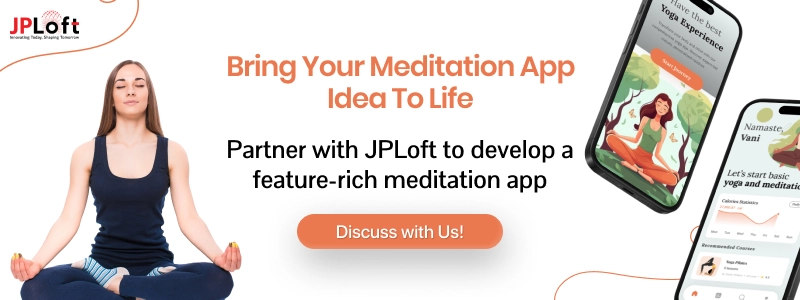
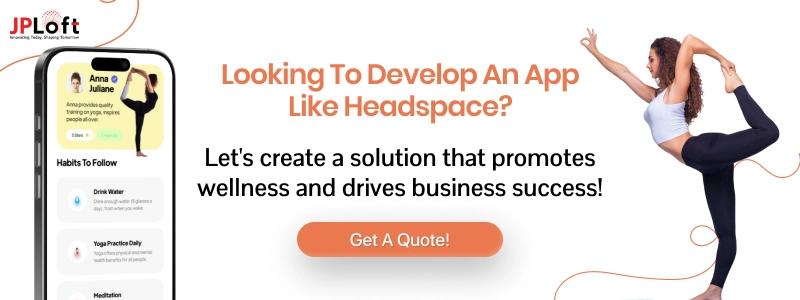

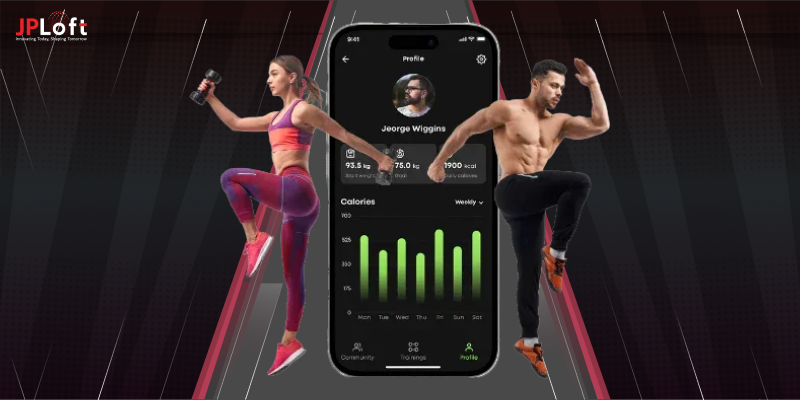
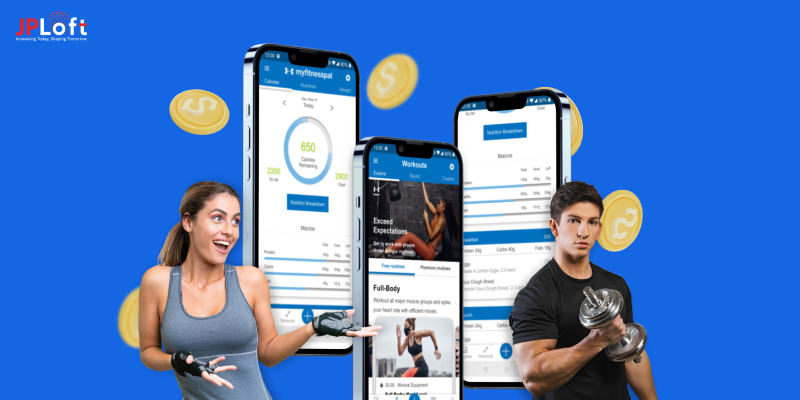
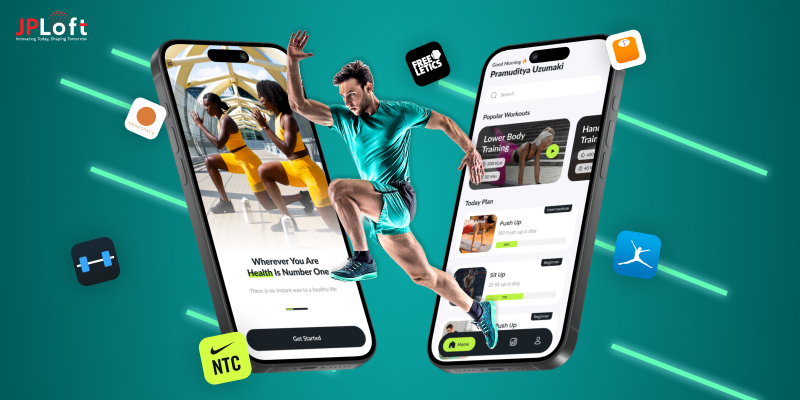



Share this blog